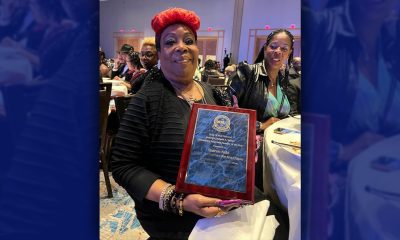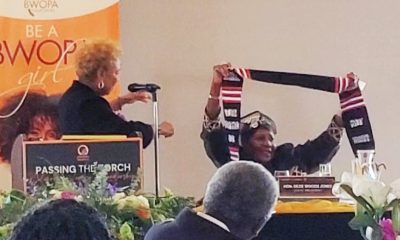City Government
Council Members Kill Police Accountability Measure
A push by a community coalition asking the Oakland City Council to put a police accountability commission measure on the November ballot was always a long shot.
As a result, members of the coalition were disappointed but not discouraged this week when the measure died at the council’s Public Safety Committee, supported only by the committee’s chairperson, District 5 Councilmember Noel Gallo.
“This is a World Series, and that was only game one,” said Rashidah Grinage, executive director of People United for a Better Life in Oakland (PUEBLO) and a leader of the community coalition.
Coalition groups, according to Grinage,
always knew that resistance from the police union and some members of the council meant that a petition drive to put a charter amendment on the ballot in 2016 was more likely to be successful.
But they decided to try the shorter route because two years is a long time to wait for police reform, and OPD backsliding may become an issue when federal court oversight ends in the near future.
What makes a police accountability commission so crucial, say its supporters, is the proven failure of the city to hold officers accountable for serious offenses against local citizens.
These failures have cost Oakland more than $58 million in police misconduct civil awards in the past decade. Further, OPD has remained under federal court control for more than 11 years, though compliance with the requirement that the department institute constitutional policing practices was supposed to be achieved within five years.
The accountability measure proposes to create a commission, made up of residents appointed by the mayor and council members, which would take over the City Administrator’s authority to oversee OPD.
According to the measure’s backers, Oakland’s consistent failure to punish police misconduct can be traced to the City Administrator s overly cozy relationship with the police department and a resulting unwillingness to initiate or uphold discipline against individual officers.
Speaking at the Public Safety meeting, Councilmembers Libby Schaaf and Lynette McElhaney said the council needs more time to consider and revise the measure before sending it to the ballot.
McElhaney said she was working hard to develop and pass a measure in November that will be the successor to Measure Y, the $22 million public safety tax that funds over 50 police officers and a number of youth programs.
“This (police measure) requires the same kind of diligence,” McElhaney said. “I think we owe that to everyone. There are things to that need to be considered. There are numerous questions.”
If people rush ahead without sufficient deliberation, the results can be disappointing, she said. “We (may) think that we’re going to fix something… and it ends up being heartbreaking.”
“I’m not prepared to move this up to the council,” said Schaaf. “Far too many questions have been raised.”
She said she would like the measure to be discussed again by Public Safety, “perhaps in the fall.”
Dan Kalb said he supports the idea of citizen oversight of the police, but “the devil is in the details.”
“This is something we really want to see this year, he said, adding that the measure might have a good chance of winning if it makes the 2016 ballot, a presidential election year. “ I hope we’re going to get there.”
Responding to his colleagues, Gallo argued that council members were not being called upon to agree with the measure but to pass it forward so that Oakland voters can decide.
“The reason I entertained (this measure) is not because I agreed with everything,” Gallo said. “My job is to facilitate. What we have has not worked.”
“I hear that people lack confidence in the City Council and police officers,” he said. “This city has been dysfunctional for a long, long, long time.”
Council President Pat Kernighan attended the meeting to offer, she said, “a different perspective.”
The measure’s supporters place “too much emphasis on the last five to 12 years,” Kernighan said. “We need to acknowledge when progress is being made. We are finally moving forward, and I think we have to give it a chance.”
Asked his position on the measure, Police Chief Sean Whent said, “I don’t think it’s proper for me to take a position one way or another on this.
“I would agree there needs to be (police accountability). I agree that police should be held to a higher standard,” he said, adding that, “We have made significant progress.”
Civil rights attorney and mayoral candidate Dan Siegel, who attended the Tuesday meeting, told the Post he believes the council should have let the measure go to the voters.
“I’m really frustrated with members of the council, particularly Councilmember Schaaf, for keeping the people of Oakland from have an opportunity to vote on this thing. It doesn’t mean they have to agree with it.”
“I guess (some) people don’t want to upset the OPOA (Oakland Police Officers Association) and don’t want to take a strong position to make sure the police department is accountable.”
Activism
Oakland Post: Week of November 26 – December 2, 2025
The printed Weekly Edition of the Oakland Post: Week of November 26 – December 2, 2025

To enlarge your view of this issue, use the slider, magnifying glass icon or full page icon in the lower right corner of the browser window.
Activism
Oakland Post: Week of November 19 – 25, 2025
The printed Weekly Edition of the Oakland Post: Week of November 19 – 25, 2025

To enlarge your view of this issue, use the slider, magnifying glass icon or full page icon in the lower right corner of the browser window.
Activism
IN MEMORIAM: William ‘Bill’ Patterson, 94
Bill devoted his life to public service and education. In 1971, he became the founding director for the Peralta Community College Foundation, he also became an administrator for Oakland Parks and Recreation overseeing 23 recreation centers, the Oakland Zoo, Children’s Fairyland, Lake Merritt, and the Henry J. Kaiser Convention Center.

William “Bill” Patterson, 94, of Little Rock, Arkansas, passed away peacefully on October 21, 2025, at his home in Oakland, CA. He was born on May 19, 1931, to Marie Childress Patterson and William Benjamin Patterson in Little Rock, Arkansas. He graduated from Dunbar High School and traveled to Oakland, California, in 1948. William Patterson graduated from San Francisco State University, earning both graduate and undergraduate degrees. He married Euradell “Dell” Patterson in 1961. Bill lovingly took care of his wife, Dell, until she died in 2020.
Bill devoted his life to public service and education. In 1971, he became the founding director for the Peralta Community College Foundation, he also became an administrator for Oakland Parks and Recreation overseeing 23 recreation centers, the Oakland Zoo, Children’s Fairyland, Lake Merritt, and the Henry J. Kaiser Convention Center.
He served on the boards of Oakland’s Urban Strategies Council, the Oakland Public Ethics Commission, and the Oakland Workforce Development Board.
He was a three-term president of the Oakland branch of the NAACP.
Bill was initiated in the Gamma Alpha chapter of Kappa Alpha Psi Fraternity.
In 1997 Bill was appointed to the East Bay Utility District Board of Directors. William Patterson was the first African American Board President and served the board for 27 years.
Bill’s impact reached far beyond his various important and impactful positions.
Bill mentored politicians, athletes and young people. Among those he mentored and advised are legends Joe Morgan, Bill Russell, Frank Robinson, Curt Flood, and Lionel Wilson to name a few.
He is survived by his son, William David Patterson, and one sister, Sarah Ann Strickland, and a host of other family members and friends.
A celebration of life service will take place at Henry J. Kaiser Convention Center (Calvin Simmons Theater) on November 21, 2025, at 10 AM.
His services are being livestreamed at: https://www.facebook.com/events/1250167107131991/
In lieu of flowers, donations can be made to the Euradell and William Patterson scholarship fund TBA.

-

 Activism3 weeks ago
Activism3 weeks agoOakland Post: Week of November 12 – 18, 2025
-

 Activism2 weeks ago
Activism2 weeks agoIN MEMORIAM: William ‘Bill’ Patterson, 94
-

 Activism3 weeks ago
Activism3 weeks agoHow Charles R. Drew University Navigated More Than $20 Million in Fed Cuts – Still Prioritizing Students and Community Health
-

 Bay Area3 weeks ago
Bay Area3 weeks agoNo Justice in the Justice System
-

 #NNPA BlackPress3 weeks ago
#NNPA BlackPress3 weeks agoThe Perfumed Hand of Hypocrisy: Trump Hosted Former Terror Suspect While America Condemns a Muslim Mayor
-

 #NNPA BlackPress2 weeks ago
#NNPA BlackPress2 weeks agoTrump’s Death Threat Rhetoric Sends Nation into Crisis
-

 #NNPA BlackPress4 weeks ago
#NNPA BlackPress4 weeks agoProtecting Pedophiles: The GOP’s Warped Crusade Against Its Own Lies
-

 #NNPA BlackPress3 weeks ago
#NNPA BlackPress3 weeks agoIn Major Win for Rep. Al Green, Texas Maps Blocked by Federal Judge





























































